Cost Information & Sales
| BoxnProducts | Unit Avg Cost(RS)2009-10 |
| Wheel | 26200 |
| Axel | 51700 |
| WheelSet | 106500 |
The plant was created with the aim of meeting the demand of IR. Hence the products turned out are transferred to other Railways on cost-to-cost basis (without profit). The current imported cost of Box N Wheel, Axle and Wheel sets are Rs 52,000, Rs 55,000 and Rs 2,50,000 respectively. There has been a huge recurring savings for IR on account of RWF. The value of sale of our finished product to IR for the last 5 years is given below;
| Year | Value in Crores of rs |
| 2003-2004 | 318.81 |
| 2004-2005 | 345.83 |
| 2005-2006 | 478.49 |
| 2006-2007 | 509.84 |
| 2007-2008 | 536.75 |
| 2008-2009 | 917.03 |
The value of production expected to cross RS.1000 crores in 2009-10. RWF has so far executed Rs. 204 Cr worth orders to Non-Railway Customers inclusive of Rs. 5.43 Cr. to overseas customers & earned a profit of Rs. 21.57 Cr.
QUALITY CONTROL:
Quality Control is achieved by rigid stage inspection to the required standards with the assistance of semi-automatic testing equipment. Some of the important testing equipment used in the process are given below. Direct reading spectrometer. Magnaglo equipment for wheel testing. Ultrasonic Automatic detection of internal flaws in wheel rims. End to End as well as Radial Ultrasonic Axle testing Magnetic particle testing for surface cracks. High Magnification microscope for taking photomicrographs. Universal tensile testing machine. Combined Hardness tester Pollution monitoring. As a back up, a modern metallurgical and chemical laboratory has been set up with qualified staff who are entrusted with the responsibility of continuously monitoring the products at various stages to ensure consistent quality.
MANAGEMENT INFORMATION SYSTEMS
Rail wheel Factory information technology resources are the best of its kind on Indian Railways. High-level online integrated information management system (IIMS) is deployed on the State-of- the-art hardware and software. IIMS is made available on the local area network (LAN), which spans across the factory, administrative building and hospital IIMS is a decision support system. It has helped in increasing production duly maintaining quality and playing a major role in controlling the inventory levels and ensuring prompt and timely payments to suppliers, contractors and employees.
FUTURE PLANS
The plant is on the threshold of massive expansion for meeting the everincreasing demand of IR for our products. The expansion plan envisages an increase in the annual production capacity of the plant to 2,00,000 wheels and 75,000 axles with an estimated investment of Rs 40.27 Cr. RWF has already spent Rs. 111.42 Cr. towards replacement of Machineries & Plant and have further plans to replace Machineries & Plant worth of Rs.133 Cr. in a couple of years. RWF is also likely to add Assets worth of Rs. 475 Cr (approximately) to augment the capacity to meet the requirement of 11th plan in the near future.

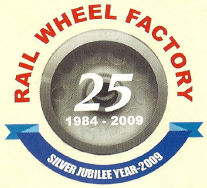 |
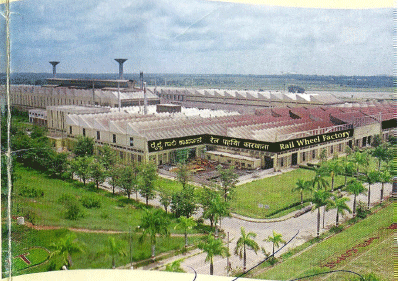 |
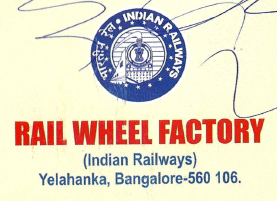 |
GENESIS
It is truly said that the invention of the wheel and axle was one of the greatest inventions of humanity. The evolution of thought beginning with the first use of the wheel and axle has led to mass transportation systems of today. Indian Railways with a network of more than one lakh track kilometers and a fleet of more than two and half lakh vehicles such as wagons, coaches and locomotives is a major user of the steel wheel and axle. Till early 1980s, Indian Railways were heavily dependent on imports for meeting their requirement of wheels and axles. Indigenous capacity was available only at TATA Iron & Steel Company (TISCO) and Durgapur Steel Plant (DSP). The TISCO plant was technically not capable of meeting the changing requirement of wheels and axles for the new designs of rolling stock. The performance of DSP was quite indifferent and this plant was only able to partially meet Indian Railways' needs. The cost of imports was high with prices rising in the world market. Financing of imports, delays in supplies and limited availability of foreign exchange adversely affected wagon production and rolling stock maintenance. It was in this context that, in the early 1970s, the Railway Ministry felt the necessity for setting up a new specialized Production Unit for manufacture of rolling stock wheels and axles. Thus the project to set up the Wheel and Axle Plant at Yelahanka, was sanctioned in 1973-74. However, subsequently, there was rethinking keeping in view the capacity of the Durgapur Steel Plant. Finally, the Government of India cleared Wheel & Axle Plant project in June 1978 at a cost of Rs. 146 crores. Financing of the foreign exchange requirement was arranged through the World Bank assistance in November 1978.
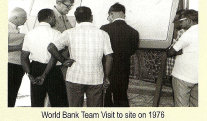
The ultimate objective was that DSP and the Rail Wheel Factory (formerly Wheel & Axle Plant) should be able to totally meet Indian Railways requirement for standard wheels and axles so that their import could be stopped. An extensive study was made of the latest technology and equipment available globally, possibility of collaboration and foreign exchange requirement. Based on this study, IR decided to: 1. Adopt the cast wheel technology developed by MIs Griffin Wheel Co., USAforwheel manufacture. American Railroads have been using cast wheels for freight operations while European Railways use forged wheels. Adoption of cast wheel technology was found more suitable as the productivity of the plant is higher and cost of production lower as compared to forged wheels.
CONTROLLED PRESSURE POURING OF WHEELS
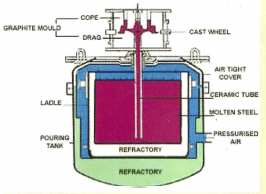
2. Undertake axle forging on special purpose Long Forging Machine followed by heat treatment furnaces with automated conveyors for movement of axles.
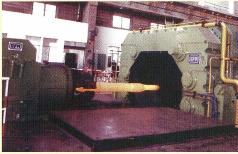
3. Provide axle-machiningfacilities incorporatingprofile copying lathes special purpose end machiningequipment and a wheel set assembl complex,withintegratedengineeringfor handlingandmovementof axles.

IMPORTANT EVENTS
1979-80:Thespecificationsof machinery& plant and plant layout wer finalized by the team of officers which was deputed to works of OL collaboratorsfor wheel manufactureviz., Mis Griffinwheelcompany,US. andglobaltenderswereissued.
18thJan 1980: Dedication ofthe Wheel and Axle Plant to the Nation by Hon'ble President of India, Sri Neelam Sanjeeva Reddy. The other dignitaries present who attended the function were: Shri Govinda Narain, Hon'ble Governor of Karnataka, Shri R. Gundu Rao, Hon'ble ChiefMinisterofKarnataka, Shri Kamalapthi Tripathi, Hon'ble Ministerof Railways and Shri C.K. Jaffer Sharief, Hon'ble Minister of State for Railways.

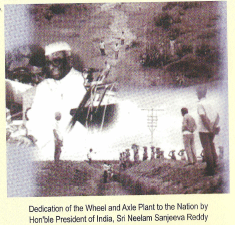 |
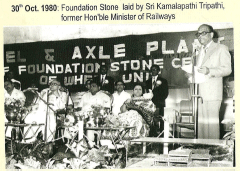 |
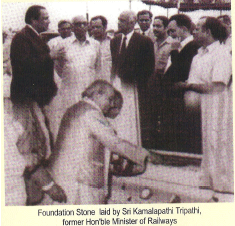 |
 |
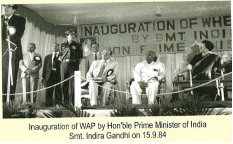 |
1S'h Sept 1984: Inauguration of the Wheel and Axle Plant by la Hon'ble Prime Minister Sm!. Indira Gandhi. The other dignitaries prese who attended the function were: Shri A.N Banerjee, Hon'ble Governor Karnataka, Shri Ramakrishna Hegde, Hon'ble Chief Minister Karnataka, Shri Jaffer Sharief, Hon'ble MinisterofState for Railways.
SALIENT FEATURES

- Only integrated plant in the world to manufacture Wheels, Axles and Wheel sets under one roof,
- Annual production levels in excess of bench mark target set by the Railway Board every year since inception,
- Turn over went up by more than 70% in 2008-09,
- Targeting to achieve annual wheel Production of 2 lakh during the year 2009-10.
- Till date, no report or record of online failure of RWF Products.
- First Indian Railway Unit to receive Patent (for its micro alloyed cast steel wheel),
- ISO: 900-2000 for Quality Management Systems
- ISO: 14001-2000 for Environmental Management Systems
- OHSAS-18001: 1999 for Occupational Health & Safety System standard by IRQS
- Association of American Railroads (AAR) Accreditation for Manufacture of wheels and axles
- Winner of Golden Peacock Awards under various categories Wheel & Axle Plant has many unique and modern features incorporating State of Art development in Technology and design, Some of these are very briefly recapitulated below;
- The Civil Engineering structures were planned on with Modern Architectural concepts based on reinforced and pre-stressed concrete, which besides giving an attractive appearance, require a low level of maintenance, The entire design ha been developed to be cost effective but atthe same time highly functional and have an aesthetic appearance,
- The cast steel technology used in the manufacture of wheels uses the scrap steel collected from Railways own workshops as the raw material. The entire process of melting, casting with controlled pressure pouring into graphite moulds and different heat treatment operations to develop optimum physical and metallurgical characteristics has been automated to optimize production, ensure rigid quality control and to minimize workers fat ig u e, The working conditions of the staff looking after the production process are very much superior to those generally available in Melting and Moulding Shops,
- In case of axles, a precision Long Forging machine capable of a high rate of production supported by specialized machining centers and other automatic machines which finish the axle in stages to the desired profile and finish is employed, The final pressing of the wheels to the axle is undertaken by an automatic machine with pre-set limits of interference, tolerances and close control of pressing pressures, The end product therefore is a precisely engineered product with little scope for human errors,
- October 1984 First wheel set assembled (BOXN)
- January 1990 Implementation of Incentive Scheme June 1993 Introduction of LAN in WAP
- 15th February 2003 WAP renamed as 'Rail Wheel Factory'
- 18th March 2004 50,000 th heat cast
- 16th June 2006 receive Patent for its micro alloyed cast steel wheel
- June 2007 Introduction of Double ladle working on regularRWF became the First Indian Railway Unit to basis
- Dec 2007 Three furnace operation started
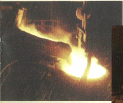 |
 |
 |
 |
PRODUCTION PERFORMANCE
The project estimated capacity of the Wheel & Axle Plant was equivalent to 56,700 Box-N-Wheels on the basis of steel volume, 46,000 of these would be used to assemble 23,000 wheel sets and the remaining are for supply as spare wheels, The production build up was anticipated to reach 100% capacity during the fourth year 1988-89, The targeted production level of 23,000 wheel sets was achieved during 1986-87 itself, with loose wheels to the tune of 1000 wheels that year, With regard to Axle Shop, the targeted production of axles of 23,000 was also reached by 86-87, Over a period, capacity has been augmented to meet the increasing demand of IR and other customers, Enhancement of capacity under various stages and present production levels are given below
| STAGE | WHEELS | AXELS | WHEELSETS |
| 1984 (Commissioning) | 56700 | 23000 | 23000 |
| 1990 (Incentive) | 67500 | 35000 | 35000 |
| 1995-96 (3" Shift) | 67500 | 48000 | 35000 |
| 1998 (Augmentation Phase-I) | 95000 | 48000 | 35000 |
| After Augmentation Phase II | 115000 | 65500 | 48000 |
| 20008-09 (Actual Production) | 196261 | 84428 | 63673 |
| 2009-10 (up to Aug '09)-in five months | 80530 | 33582 | 23866 |
Till August 2009, RWF has so far manufactured 21,43,445 Wheels 10,80,707 Axles and 7,76,635 Wheel sets for Indian Railways, wagor building industry and export
Awards Bestowed
- Prestigious Golden Peacock ~afiQnal Award for Quality in t year 1997
- Best Quality Management Company award by BID during 1998
- Arch of Europe ~ward for~excellence jn Qua.Jity by Busine Initiative Directions,Europe during 1999
- Best Environmental Management company award by lor during 2002
- Golden Peacock National Envi'rclQmental ManagementAward in 2011
- Golden Peacock Natlonallnnovatlve Product award during 2003
- Greentech Environmental Award in the year 2003
- Laxman Rao Kirloskar Merit Certificate for Best Foundry in 2003
- Greentech Safety Award in 2004
- Rajiv Gandhi Parisara Prashasthi Award in 2004
- Golden Peacock Award for Corporate Social Responsibility in 2004
- Golden Peacock National Quality Award in 2005
- Golden PeacockAwardl'fo: occ,~pational Health and safety for 200£
- Awards won every year at horticplture sliow Lalbagh I Bangalore



 Facebook
Facebook Twitter
Twitter

